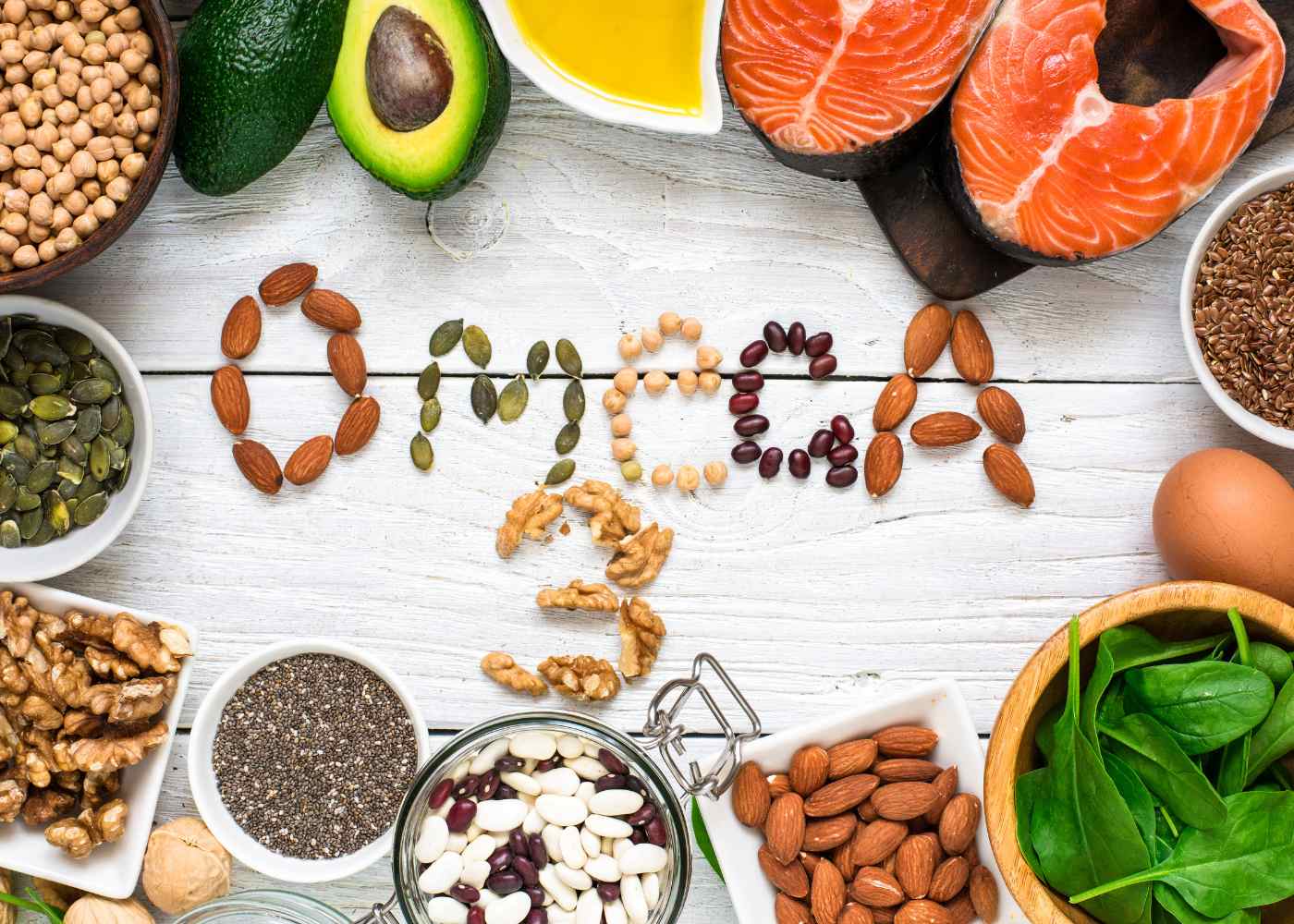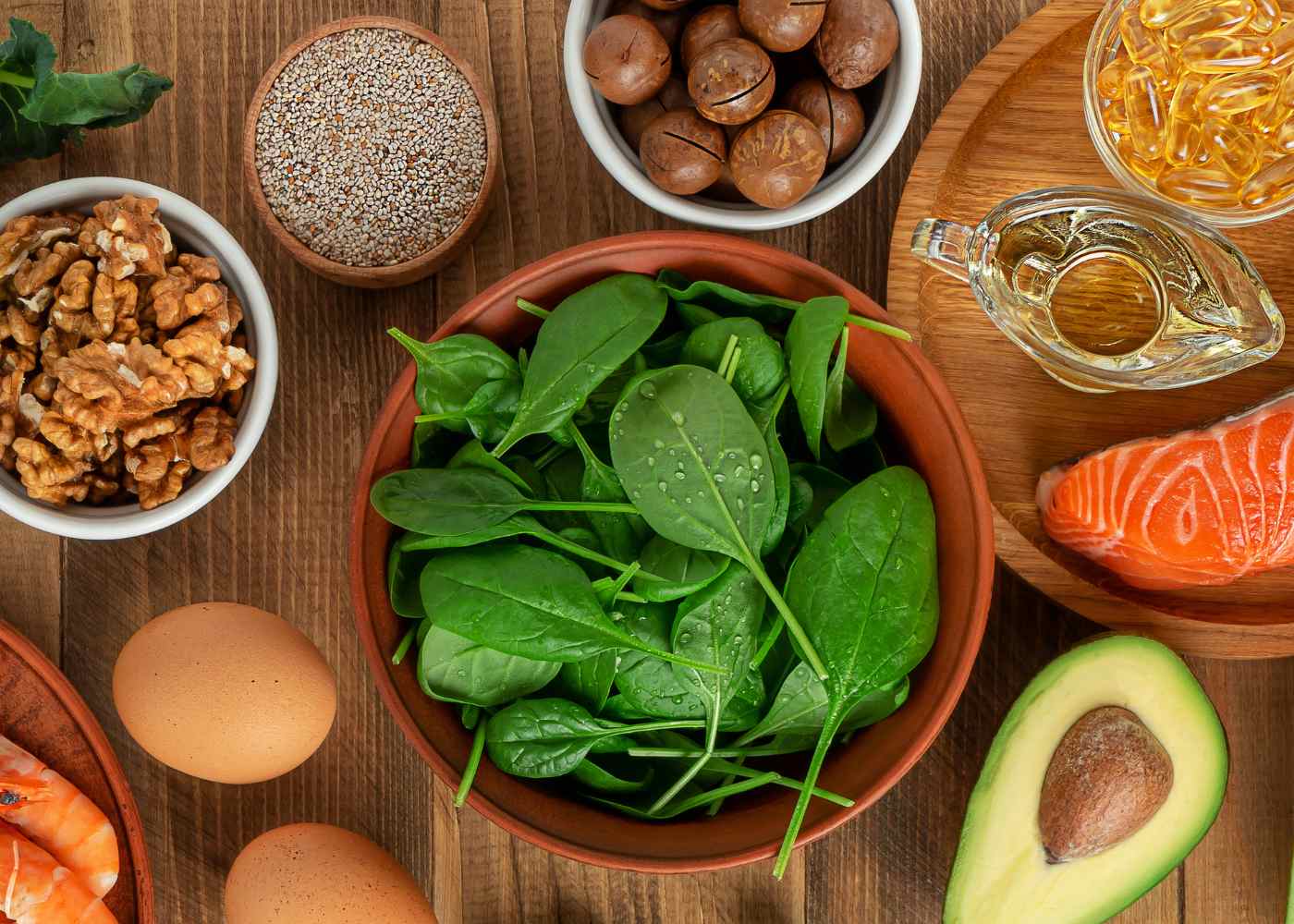
Omega-3 fatty acids are essential dietary fats that can not be produced in our bodies and must therefore be obtained from external sources. Omega-3s are necessary for maintaining healthy brain function, reducing inflammation, supporting cardiovascular health, and more. Some of the main benefits associated with consuming a diet rich in omega-3™s include lowered risk of heart disease, improved cognitive performance and mental clarity, reduced symptoms of depression and anxiety, better skin health and overall increased well-being. There is an abundance of foods containing omega-3 fatty acids available to us today; ranging from fish to plant oils to nuts and seeds. Eating these foods regularly will help ensure you get your daily dose of these important nutrients while also benefiting from their many other nutritional properties.

Fish
Fish is an important source of omega-3 fatty acids that can help improve overall health and well-being. Salmon, mackerel, sardines, herring, and anchovies are all great choices when looking for a source of these essential nutrients. Salmon in particular is especially high in omega-3s making it one of the best sources available. It also contains other beneficial vitamins and minerals such as Vitamin B12, selenium and phosphorus. Mackerel is another excellent option providing a rich supply of both EPA and DHA varieties of Omega-3s along with several other essential vitamins and minerals like Selenium, Niacin, Phosphorus and Potassium. Sardines are known for their high concentration of Omega 3™s as well as being loaded with calcium which helps promote strong bones. Herring has similar benefits to salmon but generally comes at a lower cost making it more accessible to many people who may not be able to afford pricier options like salmon or mackerel. Finally, Anchovies offer an impressive dose of omega-3 fatty acids along with vitamin B12 while also being low in mercury levels compared to some larger fish species so they are an ideal choice for those wanting more sustainable seafood options.

Nuts and Seeds
Nuts and seeds are another great option for getting a daily
dose of omega-3 fatty acids. Chia Seeds in particular contain an impressive
amount of these essential fats with one tablespoon providing around 4 grams of
Omega-3s. These tiny little superfoods also offer several other important
nutrients such as calcium, magnesium, phosphorus, zinc and iron making them a
great addition to any diet. Walnuts have long been considered a brain food due
to their high concentration of polyunsaturated fatty acids including omega 3™s
which can help improve cognitive performance while also improving memory.
Flaxseeds boast numerous health benefits thanks to their potent combination of
fiber, lignans and omega-3™s; all helping promote digestive health while reducing
inflammation and lowering cholesterol levels. Hempseeds provide the perfect
balance between Omega 6 and Omega 3 fatty acids thus enabling your body to
better absorb both types more efficiently than if you were just consuming one
variety alone. Finally, Pumpkin Seeds are an excellent source of monounsaturated
fat along with being rich in zinc which helps support the immune system as well
as aids in vision maintenance
Vegetables and Fruits
Vegetables and fruits are an important part of a healthy
diet, providing essential vitamins and minerals that our bodies need to stay
strong and energized. One of the best sources of these nutrients is found in
kiwi fruit, which contains significant amounts of Vitamin C as well as fiber.
Avocado is also a great source of monounsaturated fats, which can help reduce
cholesterol levels when consumed in moderation. Spinach is another powerhouse
vegetable; it™s rich in iron, calcium and vitamin A among other minerals.
Brussel sprouts provide plenty of fiber along with many antioxidants including
Vitamin C, while broccoli offers its own unique set of benefits such as being
low calorie yet high in dietary fiber and containing several Vitamins A, B6
& K. All five types offer an abundance of healthful benefits so
incorporating them into your meals regularly will ensure you™re getting all the
nutrition you need!
Plant Oils
Plant oils are a great source of omega-3 fatty acids and other essential nutrients. Soybean oil is one of the most commonly used plant oils, offering an abundance of health benefits including being high in polyunsaturated fats which can help to reduce cholesterol levels. Flaxseed oil is another popular choice due to its beneficial properties such as providing omega-3 fatty acids along with plenty of fiber and lignans; both have anti-inflammatory effects on the body. Rapeseed oil is also a good option for cooking as it has lower saturated fat content than other types while still providing essential fatty acids that our bodies need. Wheat germ oil offers numerous benefits thanks to its unique combination of vitamins E, A & D, selenium and zinc among others; all helping promote optimal health when consumed regularly. Finally, Perilla Oil provides an impressive dose of Omega 3™s along with vitamin E which helps protect cells from oxidative damage caused by free radicals making it a must-have for anyone looking to improve their overall well-being!

Supplements
Supplements are a great way to make sure you™re getting the
essential omega-3 fatty acids your body needs. Fish oil is one of the most
popular supplements for this purpose, providing an abundance of EPA and DHA
which are both beneficial for reducing inflammation and supporting
cardiovascular health. Krill oil has also been gaining popularity lately due to
its high concentration of Omega-3s as well as being rich in astaxanthin; a
powerful antioxidant that can help protect cells from oxidative damage caused
by free radicals. Algae oil is another option featuring an impressive amount of
these essential fats along with other important vitamins and minerals like
Vitamin B12, Selenium and Phosphorus making it an ideal choice for those
looking to improve their overall health. Flaxseed oil offers numerous benefits
such as supplying plenty of fiber, lignans and omega-3s while hemp oil provides
a perfect balance between Omega 6 and 3 fatty acids thus enabling your body to
better absorb them than if they were consumed separately. All five types offer
various advantages so choosing the right one for you will depend on what
specific benefits you™re looking for!
Conclusion
Omega-3-rich foods are some of the most powerful sources of
nutrition available to us today. Eating these foods regularly will help ensure
you get your daily dose of these essential nutrients while also benefitting from
their many other nutritional properties. Fish such as salmon, mackerel,
sardines, herring and anchovies offer a great source of Omega-3 fatty acids
along with several other vitamins and minerals like Selenium and Niacin. Nuts
and seeds like chia, walnuts, flaxseeds and hempseeds all contain high amounts
of Omega 3™s; providing both fiber as well as vitamins E & A depending on
which type is chosen. Fruits such as kiwi have an abundance of Vitamin C along
with dietary fiber while vegetables like spinach are packed with iron calcium
and vitamin A among other beneficial minerals. Plant oils ranging from soybean
oil to rapeseed oil provide plenty omega-3 fats while supplements made from
fish or krill oil can also be taken in order to boost one's intake even further.
All in all, there is no shortage of options when it comes to making sure you're
getting enough healthy omega 3's into your diet! To make the best selection for
yourself be sure to keep an eye out for labels that say œrich in EPA/DHA or
œhigh in omega-3 fatty acids when shopping for food items so you know exactly
what kind nutrition you're getting each time!




















